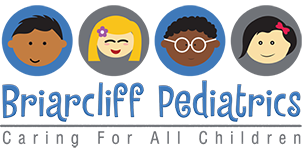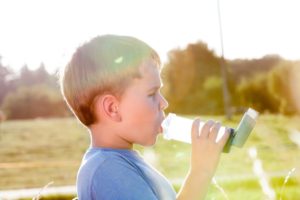Tips for Dealing with Children’s Asthma This Summer
- On Jun, 29, 2018
- Doctor Notes
- Latest News
For most children, summer means backyard barbeques, fireworks, and spending time out at the pool. But for kids with serious allergies or asthma, outdoor activities that others find enjoyable can sometimes inspire dread instead. A variety of common summer staples, like pollen, mold spores, certain fruits and vegetables, stinging insects, campfire smoke, and even chlorine fumes all have the ability to trigger a potentially dangerous asthma attack. However, just because your child has asthma doesn’t mean they have to spend their entire summer indoors. At Briarcliff Pediatrics, Dr. Raymond Deeb and Dr. Ashley Brown have a great deal of experience treating children of all ages with asthma, and they know that with the right plan in place, your child can do more than just cope with asthma symptoms. They can take control of their asthma and enjoy everything summer has to offer.
BE PREPARED
The first step is to get your child an asthma action plan that includes what to do during an asthma attack, common triggers and warning signs, your prescribed asthma controller and quick-relief medications, and emergency contact information. A copy of this plan should be given to your child’s school, day care center, babysitter, coach, grandparent and anyone else that helps take care of your child. Dr. Deeb or Dr. Brown can work with you to develop an asthma action plan for your child, and complete the necessary paperwork for their school or summer camp, during your summer well child check-up.
BE AWARE
If your child has asthma, it means that they will likely be sensitive to environmental contaminants, and that these contaminants might trigger an attack. When planning daily activities, check the local news or websites to get information on air quality and the daily pollen count. When the air quality is going to be bad, consider moving activities indoors or to an earlier time in the day so that you can keep your child’s exposure to a minimum. Be aware of the humidity, since molds and dust mites thrive when the air is moist, and take care around sources of smoke, like barbecues, campfires, and cigarettes.
BE PROACTIVE
At Briarcliff Pediatrics we can provide immediate care for childhood illnesses, but a serious asthma attack usually requires a trip to the emergency room. Fortunately, there are things that you can do to help reduce the likelihood of that happening. First, make sure that your child takes their controller medicines every day, even when they are feeling well. If you know that your child is going to be physically active and that exercise is one of their triggers, pre-treat fifteen to twenty minutes before they engage in activity and have them stop activity if you observe any early warning signs. Finally, make sure that your child stays well-hydrated by reminding them to drink plenty of water before, during, and after exercise.
Childhood asthma can be serious, but it is definitely treatable. Moreover, with proper care and planning you can make asthma treatment a part of your regular routine, minimizing inconvenience while still giving your child as much freedom as possible. If your child ever experiences a cough, with or without phlegm, shortness of breath that worsens with activity, chest pain, congestion or tightness, or wheezing or whistling when exhaling please contact Briarcliff Pediatrics to schedule an appointment. We can fully assess the underlying causes of their symptoms and help alleviate your concern. Don’t forget to follow us on social media to get up to date health tips and the latest news in children’s health care.





